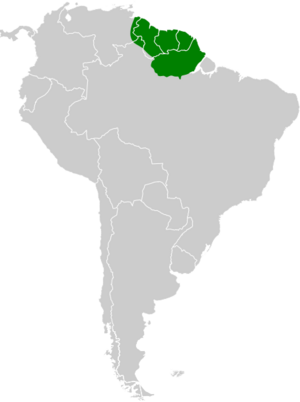Guianan puffbird facts for kids
Quick facts for kids Guianan puffbird |
|
|---|---|
 |
|
| Guianan puffbird at Manaus, Amazonas state, Brazil | |
| Conservation status | |
| Scientific classification |
|
| Kingdom: | Animalia |
| Phylum: | Chordata |
| Class: | Aves |
| Order: | Piciformes |
| Family: | Bucconidae |
| Genus: | Notharchus |
| Species: |
N. macrorhynchos
|
| Binomial name | |
| Notharchus macrorhynchos (Gmelin, JF, 1788)
|
|
 |
|
| Script error: The function "autoWithCaption" does not exist. | |
Script error: No such module "Check for conflicting parameters".
The Guianan puffbird (Notharchus macrorhynchos) is a type of bird. It belongs to the family Bucconidae. This family includes puffbirds, nunlets, and nunbirds. You can find this bird in Brazil, French Guiana, Guyana, Suriname, and Venezuela.
Scientists once thought this bird was the same as the white-necked puffbird. They also grouped it with the buff-bellied puffbird. But now, they are all seen as different species.
Contents
About the Guianan Puffbird
How Scientists Name Birds
The Guianan puffbird was first officially described in 1788. A German scientist named Johann Friedrich Gmelin gave it its first scientific name. He placed it in the group Bucco.
Later, in 1863, two other German scientists, Jean Cabanis and Ferdinand Heine, created a new group called Notharchus. This is where the Guianan puffbird is now placed. The name Notharchus comes from Ancient Greek words. It means "sluggish leader" or "chief". The second part of its name, macrorhynchos, means "long-billed" in Ancient Greek.
For a while, the white-necked puffbird and the buff-bellied puffbird were thought to be types of the Guianan puffbird. But in 2004, scientists decided they were all separate species. This means the Guianan puffbird is now considered a unique species. It does not have any subspecies.
What It Looks Like
The Guianan puffbird is about 25 cm (10 in) long. It weighs between 81 and 106 grams (2.9 to 3.7 oz). Most of its body is a shiny blue-black color.
It has a white forehead, throat, and upper chest. The middle of its belly is also white. A wide black band separates the white on its chest from the white on its belly. The white from its throat also forms a thin line around the back of its neck. Its sides have black and white stripes. Its tail is black with small white tips on the feathers. Its eyes can be straw-colored or red. Both its large beak and its feet are black.
This bird has a special song. It sounds like a series of whistles, "ui-ui-ui... wi-di-dik wi-di-dik wi-di-dik..." It also makes a clear, nasal call that sounds like "düür".
Where It Lives
You can find the Guianan puffbird in the far eastern part of Venezuela. It also lives in the countries known as the Guianas (French Guiana, Guyana, and Suriname). In Brazil, it lives in the northeastern areas, north of the Amazon River.
This bird prefers to live in old, untouched tropical forests. It also lives in forests that are partly evergreen. You can find it at all levels of the forest, from the ground to the very tops of the trees.
Behavior
Feeding Habits
The Guianan puffbird likes to hunt from an open branch. It waits there and then quickly flies out to catch its food. It usually catches insects while flying. Sometimes, it plucks them right off plants. After catching its meal, it often returns to the same branch. It might hit its catch against the branch before eating it.
Reproduction
Both the male and female Guianan puffbirds help dig out their nest. They usually make their nests inside a termitarium (a termite nest) in a tree. They also use rotting trees. Most nests are found about 12 to 15 meters (39 to 49 ft) above the ground. Some have been seen as low as 3 meters (10 ft) or as high as 18 meters (59 ft). There have also been reports of nests in holes in the ground or in earth banks. We don't know how many eggs they lay at one time.
Status
The IUCN (International Union for Conservation of Nature) has listed the Guianan puffbird as a species of "Least Concern". This means it is not currently in danger of disappearing. It lives in a large area. Its population is stable, with at least 50,000 adult birds.
 | Leon Lynch |
 | Milton P. Webster |
 | Ferdinand Smith |


